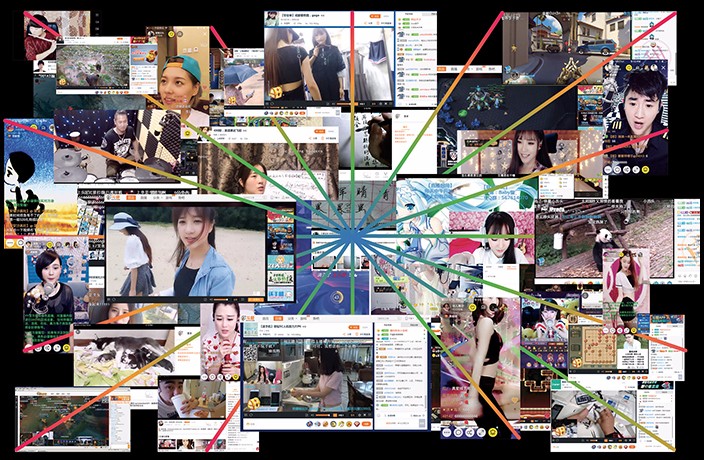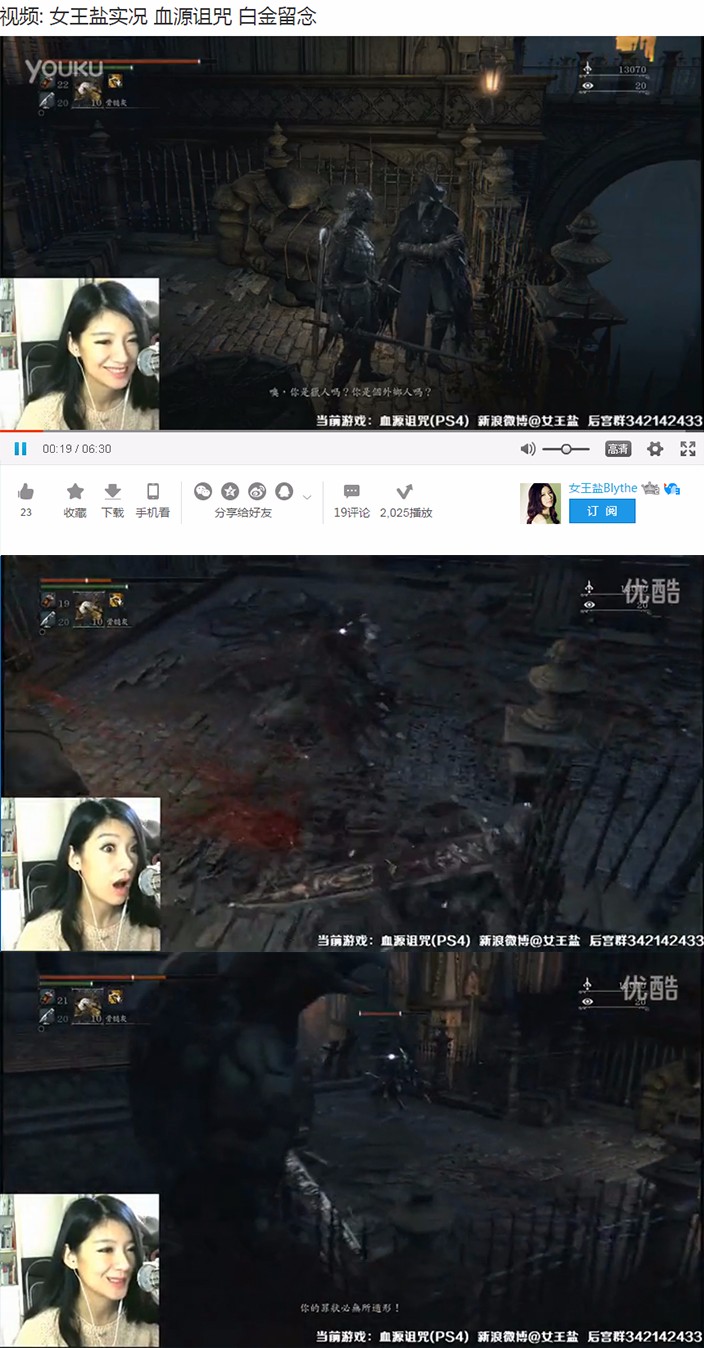"Do you think I’m like a beggar?” asks Wilber Jiang as we sit down for coffee. “Sometimes I feel like I’m a beggar.”
Jiang, 23, is not a beggar. In fact, he’s enjoying an overpriced latte at an upscale mall right now. He has a comfortable apartment. He has a day job as a public relations assistant. He has a degree from a prestigious drama school, and his WeChat moments are full of photos of him partying at flashy nightclubs. Of his shoes, he tells me: “These are Zara, but I wish they were Armani!”
Yet there is one thing he has in common with some beggars: he performs in front of strangers for money.
Jiang is a home-made star. Or perhaps we should say app-made star. He is one of a growing number of performers using live-streaming apps to entertain online viewers. Every night, he broadcasts himself to thousands, and they comment and send money in real time.
In recent months, live-streaming apps like the one Jiang uses have exploded in popularity. Douyu TV, YY and Ingkee have 200 million registered users between them, but these are just three out of hundreds of platforms. These apps have spawned ‘streaming stars’ who perform for hundreds of thousands of people every day. Some sing and dance. Some tell jokes. Some play video games. Some teach classes. The result is a new online world that is being subjected to criticism and censorship – but also one that has given entertainers a wide-reaching platform never before seen in China.

Jiang’s platform, GuoJiang TV, is a little different.
“The app I use only allows men to stream, so you end up with an audience that is mostly gay men, but also some straight girls,” he says.
After finishing his drink, Jiang walks to the two-bedroom apartment he shares with his cousins, where he sleeps on a bed in a reading nook in the spacious living room. He sits down on the couch and uses an water bottle to prop up an iPad, then flicks on the front-facing camera to see how he looks (he’s a part-time model; he looks good). After this, he presses the start button in GuoJiang’s ‘room 1236.’ It’s show time.
“Ni hao!” he greets his followers. As he launches into his own renditions of Lady Gaga songs, the bottom-left corner of his stream becomes bombarded with user comments. These are known in live-streaming lingo as danmu, or ‘bullet’ comments, because they shoot across the screen.

“Thank you!” he says as emojis begin to appear. These are ‘gifts’ – cute emoticons of flowers or la tiao (spicy snacks) that pop up indicating the sender has spent money. This money will later be split between Jiang and GuoJiang TV, then added to Jiang’s monthly salary as a contracted performer on the app. Then it’s back to singing ‘Bad Romance.’
His act is highly entertaining – tongue-in-cheek, funny even – until Jiang decides he wants a cigarette break. But the show must go on, so he says: “Let me introduce… Noelle!”
Sigh.
In the course of reporting this story, I’ve been on a lot of webcasts. And the more I interview their hosts, the more they invite me to join them. I find myself playing the role of laowai trick monkey, which, oddly enough, gains them more followers and – best yet – tips. At some point, I realize that in order to truly understand live-streaming apps, I need to be on them.
“I know it’s maybe a lot to ask,” says Katherine, a webhost who uses Ingkee to stream English lessons. “But maybe you could appear on my show. Maybe you could be my special guest.”
By this point, I’ve already been on five live streams. I’ve put in nearly 10 hours of streaming time. I know that appearing on a webcam show isn’t just fun – it’s a lot of work. Or, as Jiang tells me: “You must keep talking. Don’t let it be silent.”


I am not naturally good at this. (“Ni hao! Oh, uh… Ni hao! And ni hao to you, too! Hey! Ni hao ma? Hao. Ni hao.”) Later, at Jiang’s behest, I join him in a karaoke session (to an Adele song, for God’s sake – as if singing for over 1,000 viewers isn’t hard enough). My voice cracks so hard during my rendition of ‘Rolling in the Deep’ that I actually start coughing.
Then Jiang has us dance, much to my chagrin. He bumps and grinds like a clubbing pro while I bounce awkwardly behind him. “I’m bad at dancing,” I tell our viewers.
“No, you’re really bad at talking,” he says, laughing at his own joke.
Appearing in an online English class with Katherine would be much better suited to my skillset, but she’s based in Shenzhen. Instead, I tune in on Ingkee to watch her teach students across the country. Today’s class is being broadcast from a restaurant, and the sound of clinking glasses and clattering plates can be heard in the background. The lesson focuses on the differences between ‘can,’ ‘may,’ ‘might,’ and ‘could.’ As the stream stops buffering and Katherine first comes into focus, she’s repeating “ould, ould, ould, ould, ould, ould!”
Her viewers number in the thousands, many of whom have paid a fee to join her online course. Students can discuss English lessons over WeChat, then watch Katherine on Ingkee to hear her pronunciation – or to send gifts, of course. As Katherine chants English syllables, her followers send gifts faster than she can say “thank you.”

“Thank you for all the beer!” she says with a broad smile, as viewers send over five RMB2 ‘beers.’
Instead of buying gifts, I type “hello” into the comments section, and suddenly the rattling of “ould, ould, ould” stops as Katherine looks at the camera, seemingly straight out at me.
“Hello Noelle,” she says. “Welcome.”
The moment of connection makes me start. On an app that allows you to casually flick between web shows with a single swipe, it’s easy to forget that there are real people behind the webcams. Real people like Katherine.
Recent headlines on China’s boom in live-streaming have ranged from the baffled to the damning (“Self-harmers win celebrity on web app that amuses millions”). Last month, Hebei live-streamer ‘Sister Feng who eats everything’ went viral for eating lightbulbs, cacti and mealworms on camera.
But the headlines give a narrow view of these apps’ diversity. Chinese streaming platforms have most in common with Twitch, the American app used by gamers to stream video games. Many trace the recent fervor for live-streaming to Amazon’s takeover of Twitch in 2014.
E-sports are serious business in China. Case in point: billionaire Wang Jianlin’s son recently invested millions of renminbi to start Panda TV, a live-streaming app dedicated exclusively to gaming. At the Beijing Comic Con, crowds swarm a flashy Panda TV exhibition, where E-sports athletes stream Street Fighter V onto a massive screen as two women commentate. Panda TV users from around the country tune in online.
As industry-watcher and former video-game journalist Eric Jou explains: “You have to realize that a lot of gamers are unable to play every game that comes out because games are expensive. So what do they do? They watch other people play. They want to learn new moves, and they want to watch games with commentary.”

Alessa Zhang is one of the professional gamers who uses Panda TV to stream to fans. She says she “only” broadcasts for three to four hours on weekdays and six hours on weekends. She’d do it more, but she has a day job.
As she streams her game play, Zhang talks it through with her fans. She rattles off examples of what she says: “What do you guys think about the plot of the game? How is your combat experience in the game? Gosh, I am lost, you guys! Where should I go?” Danmu responses flood in.
She’s hesitant to say how much money she makes from the gig, but Zhang is among Panda’s top streamers and will say that “at least the money to buy new games is covered.” She attributes some of her success to her (attractive) appearance.
“Big score if the streamer is a woman and pretty,” she says. “That’s why female game streamers can get more viewers than men over the same amount of time.”
Despite higher viewer counts, she admits there are drawbacks to being a female presenter.
“Female streamers are under more pressure when live-streaming because of impolite and sexist comments. In extreme cases, they even have to deal with sexual harassment,” she says.
Indeed, attractive women rule the live-streaming universe. Over three-quarters of viewers are male, and nearly two-thirds are aged under 23. This led to a surge and, later, crackdown, in webcam pornography taking place on live-streaming apps. While on-camera nudity is illegal in China, sexually suggestive content thrived to the extent that in April the Ministry of Culture banned “suggestive” banana-eating on camera.

“They like it if you say some dirty things,” Jiang says, coaching me on how to talk on camera. For example, when one of his viewers logs back on after a few minutes offline and asks what he missed, he points at my chest and shouts: “She showed her boobs!”
“No, I didn’t!” I protest.
“Well maybe you should,” he says with a laugh.
Jiang is joking. Regulations against explicit content are stricter than ever. Currently, the Ministry of Culture requires all streaming apps to save recordings from its users’ feeds, so that censors are able to check them later for illicit activity.
Jiang’s coy demeanor, flirtatious without being lewd, works well with his audience. He talks discouragingly about his time on Blued, another streaming app geared towards gay men that was simply too suggestive for his tastes.
“It’s just on the border of being illegal, but it isn’t,” he says of the app. “A lot of the streamers will dance in revealing clothes or talk dirty. I don’t want to be like that in my streams, I want to be sweeter and not as overt. That’s what GuoJiang is better for.”
Still, Jiang insists that sex and money go hand in hand, even on GuoJiang. “My viewer count actually varies whether I write ‘gay’ or ‘straight’ in the name. I’ve had the best luck labeling it ‘bisexual,’” he says, adding: “If a rich person likes what they see, they will send gifts. If a really rich person likes what they see, they’ll send a sports car.”
Sports cars – gifts worth RMB3,000 – are the ultimate prize. While Jiang certainly appreciates the 10- and 15-kuai gifts that viewers throw at him, relying on them is impractical. To make streaming financially viable, he needs to attract big spenders.

GuoJiang is designed to help him with this – after all, the app takes a major cut. When a high-spender enters his live stream, a tiny crown emoji appears. Other viewers can’t see this, but Jiang makes sure to welcome his high-spending guests by name.
Jiang says with certainty that the men who buy him sports cars want to sleep with him – or, at the very least, want his WeChat, so they can flirt without thousands of danmu comments getting in the way. Jiang doesn’t mind handing out his WeChat if a sports car is the result of it. Ultimately, he says, these apps represent the traditional view of sex and relationships as being tied to money: “You always hear ‘Do you want love, or bread?’ If you have no bread, you shouldn’t waste time loving someone.
“In China, when two people go on a date, it is usually the guy who pays, and I think that translates into [this app]. Even in the gay community, men still want to take the lead and pay for you.”
For many streamers, this is simply how the game is played. Apart from attracting wealthy viewers, many hope to attract the attention of the app developers and get a paid contract – like Jiang has with GuoJiang TV. The company pays him a couple thousand yuan a month, and in exchange, Jiang is obliged to stream for two hours every day.
Streaming from home isn’t as easy as it sounds. I try broadcasting myself on YY to see what it is like, and also to ask those watching, rather than streaming, some questions. Namely, What the hell are you doing here?
The danmu comments roll in. User Yunxunyan says: “To learn certain skills: English, cooking.” (He also comments “Chinese people are stupid and bored,” but I’m pretty sure that’s not true.) User Dashu is on it to “make more friends,” and user Shanlingyang wants to learn from gamers and get better himself. User Yichuanryingwen simply wants “to relax.”

Streaming apps are, ultimately, a place to relax, a place to find companionship, and most of all, a place to waste time. Perhaps it’s understandable, given China’s male-leaning gender imbalance, that beautiful women like Zhang and Xu are able to command so much attention. But it takes more than a pretty face to succeed. It takes skills. And back at his apartment, Jiang is strutting his.
“You’re so beautiful today!” he tells me as I enter his living room. Then: “Last time you came here you were so ugly!”
It’s this subversive humor, along with his model good looks, that make Jiang perfect for live-streaming. But live streaming isn’t perfect for him. Two weeks after my first visit to his home, he’s complaining. He hasn’t received a sports car in over a month now, and his morale is suffering for it.
It’s not for a lack of ideas. Jiang has grand plans to turn his humble stream into a food and travel show, where he’ll take viewers to the bars, restaurants and cities he loves. He just needs funding; and for that, he needs sports cars, or at least more viewers. He’s hoping his diligence, creativity and a feature story in a certain Beijing-based English-language magazine will help.
At the end of the night’s broadcast, Jiang flashes a wide smile and waves cheerfully as he bids his viewers good-night. The second he closes the app, though, his smile droops, and he slouches back onto his couch. He puts his hands over his eyes and lets out a frustrated groan. And with that, the show is over.
Tonight, he made RMB200 in gifts. GuoJiang will take 55 percent. When I ask how he handles the exhaustion of nightly live-streaming, though, he’s more hopeful than I expect him to be.
“When I see my fans, I’m not so tired,” he says. “I feel happy.”
Photos by Holly Li, Graphics by Iris Wang
To watch Jiang’s show, go to room GuoJiang TV, room 1236. To watch Xu, follow Katherine凯瑟琳 on Ingkee. To watch Zhang, visit www.panda.tv/95588.






















0 User Comments